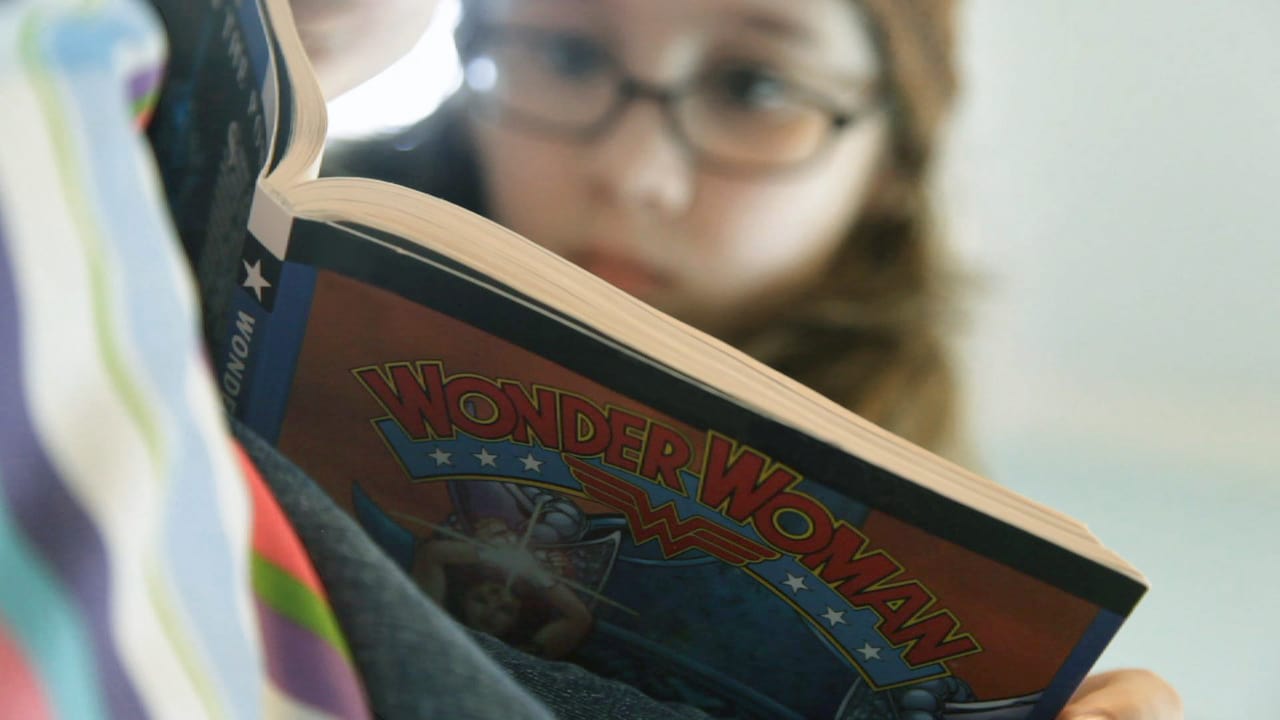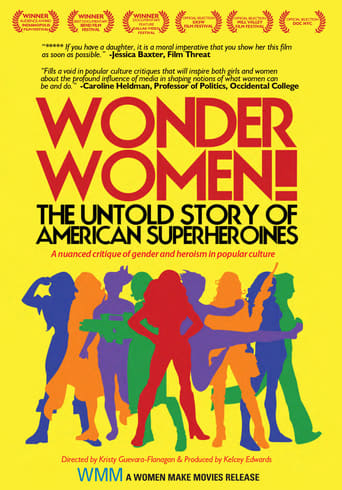

12/6/17. A great documentary about female heroines on film. And, there have been quite a few. This documentary was made before the current Wonder Woman featuring Gal Gadot who really takes female superheroes into the stratosphere. Nevertheless, this is a great doc for cinema buffs who may not have watched this particular genre, and probably should.
... View MoreThe first half of this documentary is taken up with a history of Wonder Woman herself: how her lie-detector-inventing creator, William Moulton Marston, convinced the world would be run by a matriarchy by the 2040s, wanted to create an inspirational female action hero. But after a few years of publication Marston's ideals of strong, confident, caring womanhood were junked - instead of rescuing hapless boyfriend Steve Trevor, the Amazing Amazon was featured being carried across streams by him! At much the same time, other women in American comics were being downgraded following the outcry sparked by Frederic Wertham's notorious 'Seduction of the Innocent' - powerful, independent women were seen as dangerous. In 1968, DC even took WW's super-powers away (at this point in the film, Gloria Steinem, who famously put Wonder Woman on the cover of the first issue of 'Ms' magazine, appears to claim credit for DC returning those powers in 1973). Many women talk about what the character means to them (I think if any Wonder Woman documentary doesn't feature Trina Robbins, the universe will explode).The second half of the film concentrates mainly on other female action heroines - Buffy, Xena, Thelma and Louise - and the history of the (United States') feminist movement. This follows the usual pattern of each generation giving the impression they discovered feminism and the vast male conspiracy which I've never been let in on. Adverse comment is made about the way many of the afore-mentioned female characters chose to sacrifice themselves for others (as if that is a bad thing!) - but rather than moaning about it, why not ask the actresses who willingly portrayed the roles for their opinion?As a Wonder Woman fan - the 1970s' television series got me reading American comics - I didn't learn anything new about her in this documentary. Nor did I find the feminist bits particularly interesting, as they were pretty much just rehashes of moanings I've heard many times before (instead of complaining that only 3% of decision-making jobs in production companies are held by women, why not tell us, madam, what you're doing to change that?) But any sympathetic documentary about comic books is welcome, and it was nice to see events such as the annual 'Wonder Woman Day' in Portland, which raises money for women's refuges - a fitting thing to do in the Amazing Amazon's name.
... View MoreFor as long as most can remember most of the superhero world has been dominated by male characters. With the exception of a few here and there, but there was really only one that was able to step up as equals to the her male counter parts and maintain her presence in the industry, Wonder Woman.Wonder Women! The Untold Story of American Super heroines takes a journey through history of not just birth of Wonder Woman, but the affect she had on the woman's movement of liberation and empowerment. While some will see this movie as just a woman's rights piece of propaganda disguised as a superhero documentary, it really is a bit more. Make no mistake there are some aspects of that here and clearly meant to be that way, but there is also a side that is more heart felt and intriguing. First off the background history of Wonder Woman alone is worth the entire film. It's a compelling story of what changes and controversies the character went through trying to get to the dominant persona she is today. Through interviews with well-known powerful woman such as Gloria Steinem and Kathleen Hanna, to TV's Wonder Woman herself Lynda Carter, viewers are taken on a journey to see how this simple superhero character stepped it up delivering something for young women to look up to and feel empowered just like the boys did with Superman. As intriguing as it is there are some aspects that may be a bit off putting on the stance it takes regarding women, but that doesn't make it less true. While some is clearly accurate there are others that are simple opinions of those speaking, but either way delivers a heartfelt historical story of a character dominating comics, but still fighting an uphill battle in women around the world.This will appeal more to comic fans and women, but if you are willing to take a step back and just take the journey, you will find some interesting facts of how the world has changed thanks to something as simple as a comic character. While it's thought that boys have always had more to look up to and on some level that's true, but ask most of them and you will find it came from the same place with Superman as it did for the girls with Wonder Woman. It's funny that the two most influential characters to children and adults alike have maintained in the universe together, even moving forward to become a couple, yet there is only one of them that has crossed entertainment platforms on every level. Not everyone believes it's for the same reason, but until it changes there is no evidence to convince people otherwise.http://www.examiner.com/movie-in-dallas/bobby-blakey
... View MoreI was really pleased to come across Wonder Woman at the Austin's SXSW Film Festival. It pointed out a glaring contradiction that I'd never considered while watching Lynda Carter play Wonder Woman as a kid. Most of the superhero images in the comics and the movies are Batman, Superman, Spiderman, etc. Wonder Woman is essentially the only long-standing female superhero image. It speaks to a side of sexism that hasn't been widely discussed. Even today most of the heroic images remain primarily masculine. As they point out, it is important for girls to have empowering heroic images to build their self-confidence. Interestingly, these images are not static and change with the times. Wonder woman's image was much more heroic when the character emerged in the 1930s and 1940s and regressed to a much more domestic image in the 1950s before being revived as a result of the feminist movement in the 1970s. The film goes well beyond Wonder Woman to explore how feminine superhero images have evolved in more recent films and TV programs (Charlie's Angels, Alien, Thelma & Louise, Buffy the Vampire Slayer, etc.) The film does an excellent job of recovering a lost piece of cultural history. It would be excellent teaching tool for classes that explore feminism and cultural history.
... View More